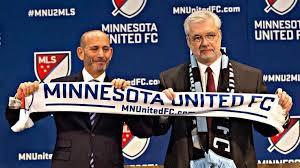By Ben Nicholson
June 18 – Minnesota’s MLS expansion franchise is in peril as their plans to build a soccer-specific stadium are struggling to receive attention in the State Capitol.
In March, MLS Commissioner Don Garber announced that Minnesota had been selected, over Sacramento and Las Vegas, to fill the expansion spot, saying, “the passionate soccer fans in Minnesota will soon have a world-class, downtown soccer stadium that will serve as the home for the new MLS team and become a destination for marquee international sports events.”
The MLS had planned to have twenty-four teams by 2020, and Minnesota seemed to have secured what is the final vacancy, assuming David Beckham will take up his contractual expansion option in Miami.
However, it now appears that the passionate soccer fans in Minnesota may be left without a forum to exhibit their lust.
The ominous construction cloud loomed early in the celebrations of Garber’s award announcement, as he made it clear that the expansion was contingent on Minnesota United FC providing stadium plans, and financing details, by July 1. Garber warned that if this did not happen that they “would then, as an ownership group, take a step back and decide whether we wanted to come to Minnesota.”
State lawmakers such as Governor Mark Dayton had at that time of the announcement already expressed no desire to use public money to help build another sports stadium, since they had spent $545 million since 2000 constructing two American football stadiums.
Even the head of the ownership group, Bill McGuire, added to the foreboding, saying: “We haven’t talked to anybody about funding at all.”
Garber, though, was propounding more optimistic rhetoric. He noted that the ownership group is “embedded in the community and has done this before both on the sports and on the civic and community side. They own the land. They have a grand vision and a good strategy to get it done,” which is strange because McGuire stated on the same day, “we haven’t developed our plans yet in how to approach it.”
Yet McGuire protested that soccer stadiums are a different beast to American football stadiums, usually costing between $100 and $200 million opposed to approaching the billion mark. McGuire believed that people just needed to understand the difference between the enterprises to get on board.
It subsequently came as no surprise that the State Legislature adjourned for the year without considering a public subsidy package for McGuire’s group, who were seeking tax reductions for their investment.
One partial excuse for the ownership group’s failure to get the Legislature’s attention is down to the MLS waiting until so late in the session to award them the franchise.
The House Speaker revealed that the stadium plans were “not mentioned one time” and that “we didn’t have any outside groups pushing us on it.”
MLS’ deputy commissioner Mark Abbott reaffirmed the July 1 deadline for Minnesota to finalise its soccer-specific stadium plans, iterating that a key reason why Minnesota were rewarded the franchise was because of their promise to deliver a soccer-specific stadium.
With McGuire stating that it would be “very difficult” to build the stadium without the tax breaks, the MLS may be preparing an unanticipated, but predictable, retreat from Minnesota.
Contact the writer of this story at moc.l1745039384labto1745039384ofdlr1745039384owedi1745039384sni@n1745039384osloh1745039384cin.n1745039384eb1745039384

